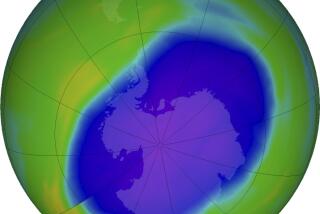Study Adds Support to UCI Findings
- Share via
For UC Irvine chemist F. Sherwood Rowland, Tuesday’s report documenting depletion of the ozone layer at both poles represents yet another vindication of his pioneering research.
“There are a lot of things happening to the atmosphere,” Rowland said in an interview with The Times in 1986, “and almost none of them are good.”
The award-winning teacher and researcher has been warning for the past 14 years that excessive use of chlorofluorocarbons had a destructive effect on the atmosphere, resulting in thousands of new cases of skin cancer each year in the United States alone.
Rowland, 61, and Mario J. Molina, one of his post-doctoral researchers, wrote in a 1974 research paper that excessive use of such chemicals in refrigerants and aerosol sprays were depleting the ozone layer, a protective band of gas that shields plants and animals from the sun’s ultraviolet rays.
Even before Rowland’s first paper was published, he and his wife, Joanne, collected every aerosol spray can in the house and tossed them out.
It was largely through Rowlands efforts--in a stream of research papers, articles, television interviews and testimony before legislative committees--that Congress in 1978 banned the use of chlorofluorocarbons in aerosol sprays.
“The response of the industry (that manufactures chlorofluorocarbons) has been to defend the chemical rather than to defend the people of the world,” Rowland said in the interview.
In addition to his work on the ozone layer, Rowland also has been studying the effects of acid rain, serving on a White House committee on the subject.
Rowland is a member of the National Academy of Sciences and has won a series of prizes, including the Tyler Prize in Ecology and Energy, the Leo Szilard Award for Physics in the Public Interest, the Gordon Y. Billard Award for Research and a distinguished research award from the UC system’s Academic Senate and Academic Council.





